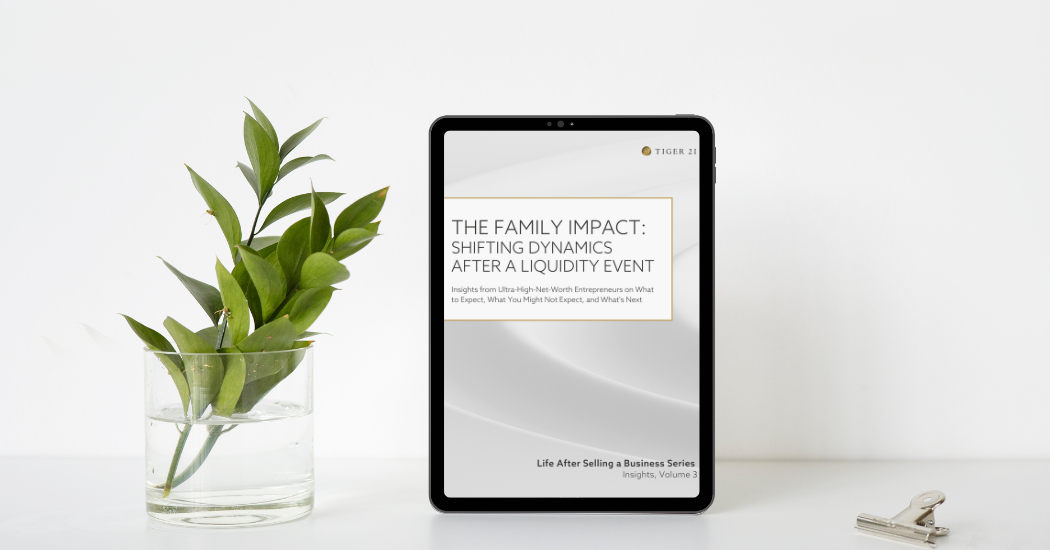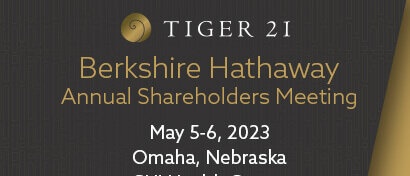Intergenerational Transition of a Family Enterprise: A Checklist

The process of transitioning the management of a family enterprise from one generation (i.e., the Transitioning Generation) to the next (i.e., the Rising Generation) can be fraught with complex and highly emotional issues. Or, with thoughtful planning, respect, and gratitude, it can be one of the most meaningful phases in the life of a family. This topic is often discussed in TIGER 21 Meetings as many Members are first-generation entrepreneurs who are contemplating how to pass their companies to the next generation.
This checklist is designed to help business owners like you 1) evaluate the foundation you’ve established for the transition of your family’s business; and 2) identify what you’ve already accomplished as well as the holes that remain to be filled. I hope it offers insights into “transition best practices,” spurs thought and conversations, and gives you a new perspective on the intergenerational transition process of a family business.
Prioritize Healthy Relationships
One measure of a successful family business transition is the health of the relationships among family members throughout and after a transition.
__ Does everyone believe that others act with the best of intent and behave accordingly?
__ Have members of both generations started working together in meaningful ways?
__ Do members of both generations honor and appreciate diversity in experience, age, perceptions, and opinions?
Clarify the Enterprise’s Culture and Legacy
Irish playwright, George Bernard Shaw, observed that “The single biggest problem in communication is the illusion that it has taken place.” That assumption can lead to major misunderstandings in the intergenerational transition of a family business when the Rising Generation is unaware of the values that govern the behavior of the Transitioning Generation.
__ Has the Transitioning Generation identified, lived, and communicated its values to the Rising Generation?
__ Can members of the Rising Generation identify the Transitioning Generation’s values and common purpose of the enterprise?
__ Has the Transitioning Generation communicated to the Rising Generation the practices it uses to invest, spend, and donate assets?
__ Do members of the Rising Generation see their role as stewards of wealth and values for future generations and others?
Manage the Distinction Between Family and Enterprise Relationships
It can be difficult to behave in one way as a family member and in another in the family enterprise. For example, during the transition of a family business, the parent/child or sibling/sibling relationship may evolve into owner/successor, owner/co-owner, or board member/board member.
The way family members operate does not always serve the enterprise. Take inclusivity and debate as examples. In a family, all members are included in holiday dinners. In the family enterprise, not all members will serve on the board or in leadership positions. Within the family, debate may be encouraged and differences quickly resolved, yet within the enterprise, challenging a member of the Transitioning Generation may not be acceptable and can bruise feelings.
Unless family members understand and appreciate that the behaviors and culture needed for the family to be healthy are not the same as those needed for the enterprise to be healthy, relationships can be damaged – sometimes permanently.
__ Do the Transitioning and Rising Generations share common values as a foundation for the operations and decision-making practices of the enterprise?
__ Have you codified in an “enterprise governance constitution:”
- The process by which decisions will be made?
- The types of decisions people in various positions (e.g., owners, shareholders, board of directors, and member(s) of the management team) are authorized to make?
- A process for hearing and discussingall perspectives before decisions are made about important issues such as the direction of the enterprise, debt, acquisitions, or the transition of ownership?
- How to manage the input of owners who are not active in the enterprise?
Establish Respect Between and Among Generations
Closely tied to understanding the distinction between family relationships and enterprise relationships is the respect with which individuals treat each other. For example, during the transition of a family enterprise when siblings become co-owners, will those active in the enterprise respect the opinions and perspective of those not active in the enterprise?
__ Do members of the Rising Generation recognize how much they may not, or do not, know?
__ Do members of the Rising Generation appreciate the wisdom of current leadership?
__ Do members of the Rising Generation respect the accomplishments of the Transitioning Generation?
__ Do members of the Transitioning Generation engage with, listen to, and appreciate the energy of the Rising Generation?
__ Are members of the Transitioning Generation mentoring members of the Rising Generation?
__ Are members of the Rising Generation engaging in the mentoring they’re receiving?
__ Do family members appreciate the perspectives and experiences of others in their own generation?
Set a Vision for the Future
Intergenerational transitions of family enterprises are more likely to succeed when both generations share a vision of the future of the enterprise and have created visions for their own futures. When members of the Transitioning Generation design meaningful “Next Adventures™” for the next phase of their lives, they share the excitement of the Rising Generation in moving forward.
__ Have members of the Transitioning Generation designed meaningful Next Adventures for the next phase of their lives?
__ Are members of the Transitioning Generation looking forward to their Next Adventures?
__ Is involvement in the enterprise part of the Rising Generation’s Next Adventure?
__ Have members of the Rising Generation begun to develop the skills and knowledge necessary to manage the family enterprise?
__ Are members of the Transitioning Generation excited about working with and mentoring members of the Rising Generation?
__ Do the Transitioning and Rising Generations share a common vision of the purpose of the family’s wealth, the strategy for the growth of wealth, and how wealth supports (or does not) each family member’s desired Next Adventure? Understanding that in family enterprise transitions no one gets everything they want, and there is always give-and-take, sets realistic expectations and fosters healthy relationships.
Act With Gratitude
The most successful family enterprise transitions are orchestrated by families who operate from a place of gratitude and abundance. These families recognize that:
- They have created valuable enterprises which support them and the communities they choose to serve;
- The Rising Generation is being offered a valuable and unique opportunity; and
- By successfully transitioning, they are giving to themselves and to those they care about.
__ Do members of the Transitioning Generation recognize and understand that it is an honor and privilege to be invited to engage in the transition of the family enterprise?
__ Do members of the Rising Generation demonstrate gratefulness rather than entitlement?
__ Do family members live with a true sense of appreciation for what they have accomplished both as individuals and as a family?
__ Are family members grateful for the foundational wealth that provides for the basis for what they can accomplish together?
__ Do family members focus on the potential opportunity rather than the burden of responsibility?
Successful intergenerational transitions of family businesses take thoughtful planning, gratitude, and respect. When all family members can distinguish between family and enterprise relationships and appreciate both family and enterprise goals, families can continue to cultivate and enhance healthy relationships, even as the number of family members multiplies. Learn more about creating a succession plan in our blog.
About Elizabeth Ledoux
Elizabeth Ledoux is the founder of The Transition Strategists and serves as a Denver Chair for TIGER 21, the premier peer membership organization for ultra-high-net-worth entrepreneurs, investors, and executives. She is a thought leader and speaker on the topics of succession planning, navigating transitions for companies and leaders, family business, strategic growth, and the business journey. Elizabeth is the host of the The Transition Roadmap podcast, and author of three books for business owners and entrepreneurs including her latest, It’s A Journey – The MUST-HAVE Roadmap to Successful Succession Planning.
About TIGER 21
TIGER 21 is an exclusive global community of ultra-high-net-worth entrepreneurs, investors, and executives.
Explore the TIGER 21 Member ExperienceMember Insight Reports











